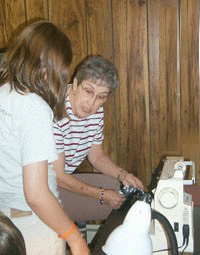Master Clothing Program Keeps Sewing Traditions Alive
Master Clothing Program Keeps Sewing Traditions Alive

When asthma forced Jo Ann Ellegood to give up her hair salon, she was lost as to what to do with her time.
“I was unhappy that I couldn’t do what I wanted to do,” she said. “So, Carol (Vinyard, the University of Kentucky Cooperative Extension Service agent for Family and Consumer Sciences in Carlisle County), a former client of mine said, why don’t you get involved in the Master Volunteer in Clothing Program.
“I had been involved in Extension. I didn’t learn to sew until I was 50. Carol taught me how to sew and it was an exciting new venture for me.”
At 55 her sewing skills had improved, and then she discovered the University of Kentucky Cooperative Extension Service’s Master Volunteer In Clothing Construction program. In 1996, she went through the training necessary to become a Certified Master Clothing Volunteer. She teaches classes in Kentucky and has become an unofficial ambassador for the program taking her knowledge to teach classes in Arizona where she lives during the winter months, as well as to other parts of the country.
As a volunteer in the program, she spends her time teaching others some of the skills she has developed. Most recently, she was teaching a group of 4-H members some of the basics of sewing.
“I learned that I really like to teach,” Ellegood said. “And it has given me a great deal of satisfaction.”
The Kentucky Master Clothing Program held its first statewide training in November 1990, and today there are approximately 80 active Certified Master Clothing Volunteers across the state. A number of states have modeled their own programs after the Kentucky program.
According to a history of the program, it began as an outgrowth of volunteer interest and concern for a longtime Extension program – sewing – that had not received a great deal of attention in the 80s. The Kentucky program is an interdisciplinary venture between Family and Consumer Science and 4-H/Youth Development with a focus on sewing.
“Sewing is different now than it was in my mother’s age when they sewed for the economy of it,” Vinyard said. “With so many people working today, plus clothing items so much more reasonability priced, sewing is more of a creative outlet. It can also be very economical.”
Training programs are conducted every year, but new members are only taken into the program every other year, said Linda Heaton, UK textiles specialist and state Master Clothing Program coordinator.
To become a Certified Master Clothing Volunteer, the program requires approximately 25 classroom hours. Then each participant is required to do at least 50 hours of community service in two years. Every two years afterward, individuals must earn 50 or more Master Credit Units (community service work) for recertification. For Ellegood that’s not a problem. She already has many more hours than she needs to be recertified in 2004 – 275 hours, in fact.
From 2000 to 2002, Master Clothing Volunteers gave more than 9,500 hours in teaching, judging and helping others. If those services were performed on a fee basis, they would have cost more than $200,000, said Heaton.
The goals of the program are to reach, teach and involve community members to affect behavior change and improve family living; to provide an in-depth educational opportunity for volunteers; to train volunteers who can help local Extension professionals plan, implement and evaluate educational programs in clothing and to expand educational offerings and increase outreach opportunities.
Program volunteers do everything from teach sewing classes to assist county agents with clothing related programs to judging clothing items entered in county fairs or other activities.
Vinyard said Ellegood adds a lot of enthusiasm and is a great supporter of Extension programs.
“Wherever she goes, she talks about the program,” she said.
Anyone wanting more information about the Master Clothing Program can contact a local office of the Cooperative Extension Service. A new class will be recruited next spring and will begin in the fall of 2004.
